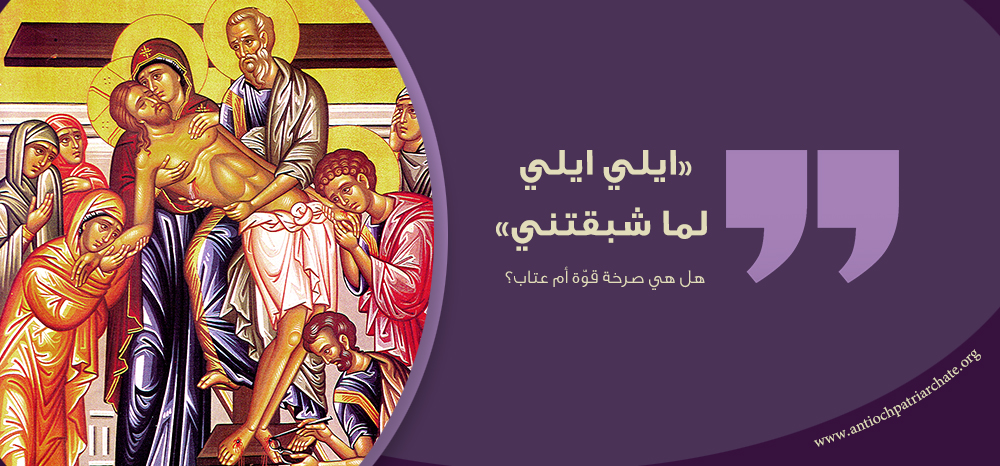
Eli, Eli, lama sabachthani?
“Eli, Eli, lama sabachthani?” is an Aramaic expression, “My God, My God, why have You forsaken Me?” This is what the Lord Jesus Christ with a loud voice, and yielded up His spirit.” (Matthew 27:46-50).
One might think at first that Jesus is expressing being abandoned by God. But have we forgotten that Jesus IS God the Son?
In fact, His divinity did not depart from His humanity at any moment, that is, his divine nature did not depart from his human nature, and all the salvific arrangement of the Incarnation, the Crucifixion, and the Resurrection is of one Trinitarian undivided will.
So what did Jesus mean by this cry? What was he saying?
![]()
The Gospel mentions that some people who were standing there, on hearing this, said: “He is calling on Elijah” (Matthew 27:47).
We must be aware of two things here:
-First, that the Old Testament speaks of the Lord Jesus Christ.
- Second, that the Lord Jesus Christ was not calling Elijah, but rather he was saying the beginning of Psalm 22.
Here is the bottom line.
Anyone who follows the words of the Lord Jesus Christ in the Gospels notes that He always reminded the teachers of the law and priests with the divine books, the psalms, and the sayings of the prophets. He was stressing that they spoke of him, testified for him (John 39: 5), and were realized in Him; He came to fulfil them. He reprimanded the Jews harshly because they had gone astray " “You are mistaken, not knowing the Scriptures nor the power of God" (Matthew 22:29).
He thus confirms by his cry that he is the expected Messiah, from here the Apostle Paul of origin said: “If they had known, they would not have crucified the Lord of glory” (1 Corinthians 2:8).
Moreover, it is very important to note that the Psalms back then were known by their introduction, that is, by the first verse.
Whoever reads Psalm 22 knows exactly the purpose, it begins: "My God, my God, why did you forsake me," and includes ... A reproach of men, and despised by the people. All those who see Me ridicule Me.... They pierced My hands and My feet; I can count all My bones.
They look and stare at Me. They divide My garments among them, and for My clothing they cast lots... All the e
nds of the world
Shall remember and turn to the LORD,
And all the families of the nations
Shall worship before You.”
All the Lord's conversations with the Jews, whether with the religious leaders, the people, or the disciples, aim at revealing himself as the Messiah.
This is what He said to Nicodemus, for example: “You are the teacher of Israel, and you do not know this!” (John 3:9). He also rebuked the Jews for their ignorance and their hypocrisy: “For if you believed Moses, you would believe Me; for he wrote about Me.” (John 5:46).
Summary:
The cry of Jesus on the cross is a meant to open their dull mind, because by accepting the Lord and asking Him to stay with us, our mind opens and we understand the Bible.
The picture is clearer after the Resurrection, as we read: “And while they were speaking of this, Jesus himself stood among them and said to them: “Then He said to them, “These are the words which I spoke to you while I was still with you, that all things must be fulfilled which were written in the Law of Moses and the Prophets and the Psalms concerning Me.” (Luke 24:44).
The Lord emptied himself willingly even unto the death of the cross to save us (Philippians 2:2).
Lord, as you opened up your disciples’ minds to understand the books, do open our minds to resurrect with you for eternal life.








